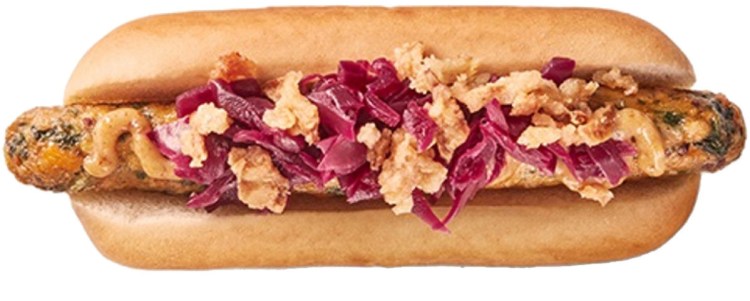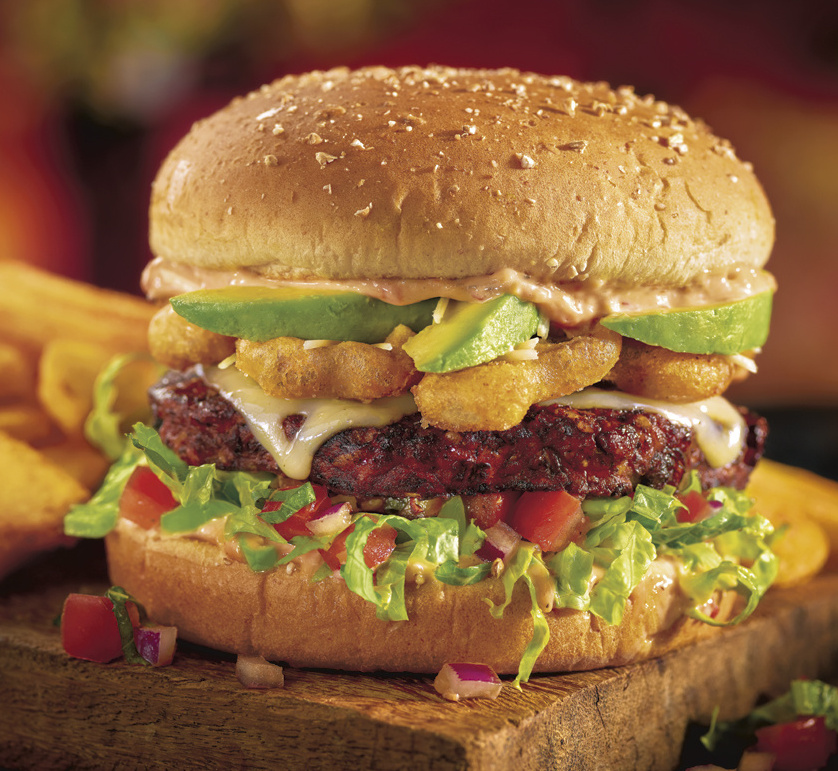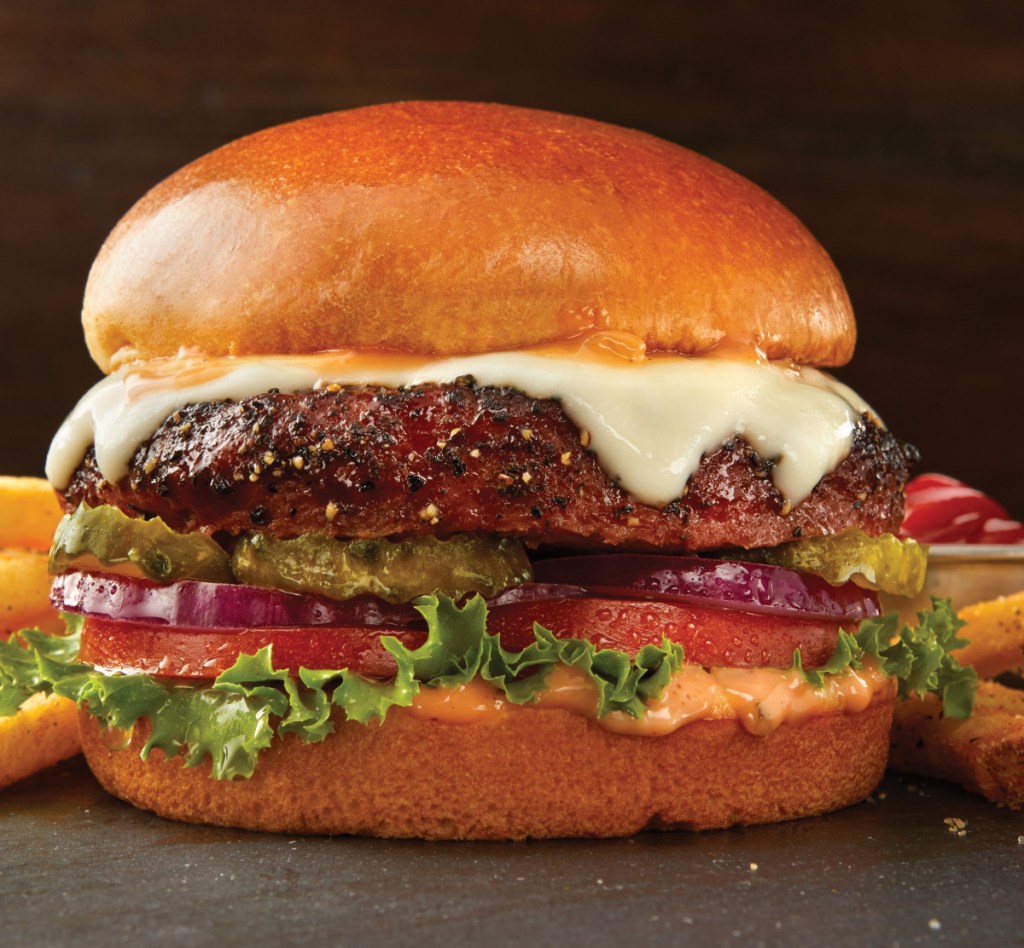In addition to the new wave of all-vegetarian fast food chains I wrote about in December, a number of well-known, quick-service restaurants are rolling out vegan burgers and other vegan menu items.
TGI Fridays added the vegan Beyond Burger to the menu at its 443 restaurants late last year. The burger comes topped with dairy-based cheese, but it can be left off to make it vegan.
“Consumer feedback during the soft launch last fall was very positive,” said Rebecca Latacz, senior director of brand marketing and innovation. Many customers couldn’t believe “what they were seeing and eating wasn’t actually beef,” she said. “Since then, we continue to receive feedback from guests saying that they came to Fridays specifically for the Beyond Meat burger.”
The newest burger brought Fridays significant positive press, including for being the fastest “test-to-table” launch in the chain’s history, and it won the company the U.S. Humane Society’s Henry Spira Award for Corporate Progress. It also caused Beef Magazine to agonize over the “growing movement to go meatless.”
Nothing I report here will soothe the anxiety of Beef Magazine readers.
According to Billy Roberts, Jr., senior food and drink analyst at marketing research firm Mintel, people of all ages have an increased interest in plant-based food. But the biggest demand comes from the young.
“The millennial generation and the iGeneration express strong interest in these vegetarian meats and veggie burgers,” said Roberts. The label iGeneration refers to people born slightly before or after 2000, making it the generation younger than the millennials.
Some of these millennials and iGens are vegans and vegetarians, yet most of them eat meat. The thing is, they want to eat less of it. Roberts noted that today’s parents are particularly open to meatless options, which means today’s kids are growing up eating lots of vegetarian food.
Other chains are adding meat-free burgers, too. White Castle, Shack Shake and Red Robin have added vegan patties to their menus.
Last month, White Castle debuted its vegan Impossible Burger slider at 140 of its restaurants in the New York, New Jersey and Chicago area. The slider comes with cheese (leave it off to make it vegan) and sells for $1.99. It too has racked up considerable positive press, with stories about the White Castle Impossible slider appearing in Time magazine, Forbes and The New Yorker. Eater went so far as to call the chain’s meatless choice “one of the country’s best fast-food burgers.”
Shake Shack unveiled its new vegan patty in late April at some locations in New York, Austin and Los Angeles. Like the other veggie burgers, it’s served with cheese, but the sauce is vegan. Meat-eating reviewers from Bon Appétit and People described its taste as similar to a beef burger and said they would order it again.
Roberts at Mintel speculated that the restaurants are adding vegan patties in order to attract families and groups of friends where one or more diner wants a meat-free option. Restaurants lacking a decent plant-based option can get vetoed quickly when there’s a vegan in the group. “The influx of veggie burgers has tried to eliminate that veto vote,” Roberts said.
This makes sense given what Red Robin’s chief marketing officer Dana Benfield told me about the January launch of its veggie burger (listed on the menu with cheese, but it can be made vegan). Benefield said the “new, custom-blended, ancient-grain-and-quinoa veggie patty meets the growing demand for beef alternatives so guest can enjoy a meal together, regardless of their individual dietary preferences.”
Red Robin has restaurants in Scarborough and Augusta.
Other recent vegan additions to fast food menus include the lentil-quinoa broth bowl at Panera Bread and the lentil-brown rice bowl at Starbucks. Meanwhile, the chain QDOBA Mexican Grill announced in March it was lowering prices on vegan and vegetarian meals to encourage customers to go meat-free. All three restaurants have locations in Maine.
In the midst of all this activity, some of the largest chains, like Pizza Hut and Domino’s, have added vegan options in other countries, but have not done so at home; last year, for instance, McDonald’s added a vegan burger to stores in Sweden and Finland. According to Roberts at Mintel, “larger restaurant chains are risk averse,” and breaking out of their meat-based menus involves many potential pitfalls.
“They want to make sure they can provide a quality taste and flavor and also replicate it on a national scale,” he said.
The logistics of sourcing vegan burgers for a few hundred restaurants in Finland and Sweden are simpler than supplying tens of thousands of McDonald’s across the United States.
“They’re going to watch the TGI Fridays and Shake Shacks and see, ‘Is there potential here to invest time and R&D?’ ” Roberts said.
One company not waiting is Swedish home furnishings retailer IKEA, which has restaurants in all its stores. In February, IKEA announced on Instagram it was testing a vegan hot dog at its store in Malmö, Sweden, as part of an effort to increase plant-based food. The company intends to add the veggie hot dog to its other European stores in August. This follows the successful launch of IKEA’s vegan meatballs in 2015.
Swedish customers have given the vegan hot dog a 95 percent favorable rating, according to Peter Ho, sales leader for IKEA’s U.S. food division.
“We do anticipate that the veggie dog will be offered in the U.S.,” he said; it will come topped with pickled red cabbage and crunchy fried onions.
According to Ho, 12 percent of IKEA customers order vegan or vegetarian dishes. He hopes to begin serving the vegan hot dog in U.S. stores no later than early 2019. It all depends on finding an American supplier.
“With the introduction of the veggie dog,” Ho said. “IKEA Malmö is seeing a new customer in their bistro, whether they are vegans, vegetarians, flexitarians or meat-reducers.”
Add up all those customers and they represent a growing demographic of people pushing restaurants to embrace plant-based meals.
Avery Yale Kamila is a food writer who lives in Portland. She can be reached at:
avery.kamila@gmail.com
Twitter: AveryYaleKamila
Send questions/comments to the editors.





Comments are no longer available on this story